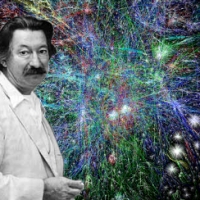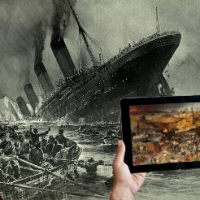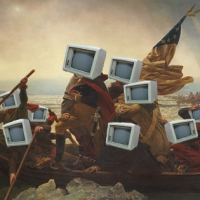Through the Google Glass
Did you know that secretly recording somebody is illegal in California? James O’Keefe, the conservative provocateur behind such doctored classics as “ACORN assists in prostitution,” has recently received a pricy lesson courtesy of this law. For O’Keefe has just settled, in the amount of $100,00, to compensate one of the ACORN employees whose actions O’Keefe misrepresented in his video. The lawsuit was able to go forward thanks to Penal Code section 632 of California’s Privacy Act, which makes it a crime to make a recording “without the consent of all parties” (you can read the law: here).
Though the damage O’Keefe’s video has wrought is not undone by this settlement, it is still nice to see him receiving a proper reward for his misdeeds. Yet, I do not wish to dwell on O’Keefe. Rather, I want to dwell on another question: what if O’Keefe had walked into the ACORN office wearing Google Glass? I wonder how Glass would factor into the law, after all, if somebody approaches you wearing Google Glass it is probably only fair to assume that you are being recorded. And unless you make it very clear that you do not consent to being filmed, it could be argued that your consent is implied. That you should have known.
I have been thinking about this in the context of two recent articles: “Google Glass: is it a threat to our privacy?” at The Guardian by Charles Arthur, and “I used Google Glass: the future, but with monthly updates,” by Joshua Topolsky, a tech journalist at The Verge (Note – Arthur quotes from Topolsky’s piece in his Guardian article).
Topolsky’s article is a fairly basic piece of tech-journalism, in which Topolsky takes pains to come across as somewhat skeptical of the new device that he has been lucky enough to try out. The piece is filled predominantly with praise, and a sense of Topolsky emerges as somebody willing to be impressed but pre-disposed to be disappointed, which serves to make his love of the product all the more important. Topolosky refers to the bothers of having to constantly check a smartphone or a tablet, and accepts the notion that Glass allows for technology to be more smoothly incorporated into daily usage.
In the end—not surprisingly—Topolsky lavishes Glass with praise, saving his harshest critique for the device’s appearance. Though Topolsky gives passing lip service to privacy concerns it is far from his focus, which is understandable as his outing with Glass is chaperoned by two of the Google staffers behind the device (Steve Lee and Isabelle Olsson). The most interesting moment in Topolsky’s article is not the expected moments of his growing adoration for the device, but an incident that Topolsky relates from his adventure. It is worth quoting in full:
“At one point during my time with Glass, we all went out to navigate to a nearby Starbucks — the camera crew I’d brought with me came along. As soon as we got inside however, the employees at Starbucks asked us to stop filming. Sure, no problem. But I kept the Glass’ video recorder going, all the way through my order and getting my coffee. Yes, you can see a light in the prism when the device is recording, but I got the impression that most people had no idea what they were looking at. The cashier seemed to be on the verge of asking me what I was wearing on my face, but the question never came. He certainly never asked me to stop filming.”
The above quoted passage has a certain absurd humor to it. The paragraph ends with Topolsky claiming of the cashier that: “he certainly never asked me to stop filming” but the same paragraph begins with Topolsky describing that the employees “asked us to stop filming.” Did Topolsky not count in the “us” that was asked not to film?
True, the device is quite new and therefore people are not yet used to seeing “a light in the prism” and knowing that they are being filmed, but the important thing remains the same: the employees who asked Topolsky and his crew to stop filming were not heeded. I do not mean to be unfair towards Topolsky, perhaps he genuinely forgot to stop recording. After all, he was inexperienced with Glass. But the “recording” aspect here is quite interesting for it makes clear the possibility of continuing to record…even if you don’t realize you are doing so, or even if those who you are recording think that you are not recording any longer.
Had the above recounted incident taken place in California would Topolsky be in the same legal mishmash as O’Keefe? Granted, the situations are very different (Topolsky is unlikely making a doctored video to link Starbucks to prostitution), but does Topolsky’s continued Glass recording qualify as a secret video? Or is it just that you should assume that you have been recorded every time you see somebody wearing Google Glass? Topolsky is not concerned with this (at least he does not express these concerns in his article); however, they are the focus of Charles Arthur’s Guardian article “Google Glass: is it a threat to our privacy?” to which it seems likely that Arthur would answer: yes. As Arthur writes:
“For Google, “privacy” means “what you’ve agreed to”, and that is slightly different from the privacy we’ve become used to over time. So how comfortable – or uneasy – should we feel about the possibility that what we’re doing in a public or semi-public place (or even somewhere private) might get slurped up and assimilated by Google? You can guess what would happen the first time you put on Glass: there would be a huge scroll of legal boilerplate with “Agree” at the end. And, impatient and uncaring as ever, you would click on it with little regard for what you were getting yourself, and others, in to. Can a child properly consent to filming or being filmed? Is an adult, who happens to be visible in a camera’s peripheral vision in a bar, consenting? And who owns – and what happens to – that data?”
While the user certainly needs to be aware of what they’re doing, and while it is a problem that we (myself included) frequently skip ahead to the “agree” on user agreements, the huge problem drawn up by Glass in terms of privacy is for those who do not use the device but have been pulled into somebody else’s data stream. Topolsky probably agreed to something before using the Glass, but what about that cashier he filmed (you know, the one who asked Topolsky not to film him)?
A case could be made that we, as a society, have become rather inured to being filmed: security cameras, traffic cameras, and so on capture our motions everyday and this constant observation is part of the “privacy we’ve become used to over time.” After all, it increasingly seems that we’ve agreed to be filmed simply by venturing outside. Yet Glass seeks to put a camera in some of the areas that had previously seemed protected from such intrusion. You might not have a camera pointing into your apartment/house/wherever but what if somebody walks into your domicile wearing Glass? What fascinating information will Google have just snapped up? And what will Google do with that data?
What it seems that Google understands (according to perfect “Don’t Be Evil” logic) is that people are wary of all-seeing-eyes floating atop pyramids and for that matter the giant flaming eye above Lugbúrz fills people with dread not comfort – indeed, people aren’t too keen on all-seeing eyes. Even for those who haven’t read 1984 it still seems too Orwellian. Rather, Google understands that it’s a waste of time to build one such eye, when it is much more efficient to disseminate tens of thousands of such eyes.
Writing many decades ago, the historian Lewis Mumford in his book The Pentagon of Power (which is the second volume of the series The Myth of the Machine [which is a fantastic book]), described how:
“The computer turns out to be the Eye of the reinstated Sun God…serving as its ‘Private Eye’ or Detective, as well as the omnipresent Executive Eye, he who exacts absolute conformity to his commands, because no secret can be hidden from him, and no disobedience can go unpunished.” (274)
Google already knows your search history, the contents of your e-mails (assuming you have a gmail account), a heck of a lot of location information (particularly if you use a Droid device), and much more…much more than any of us probably realize. The threat that Glass carries with it is subjecting every sphere of your life to the indexing of Google. Indeed the briefly listed items at the start of this paragraph sound not unlike a list that Mumford draws up when he predicted:
“The Computer—will be able to find, to locate, and to address instantly, by voice and image…any individual on the planet: exercising control over every detail of the subject’s daily life by commanding a dossier which would include his parentage and birth; his complete educational record; an account of his illnesses and his mental breakdowns, if treated; his marriage…” (274)
And Mumford goes on listing.
In Topolsky’s article about his experience with Google Glass he ends by expressing his conversion to the device. Though skeptical at first, the ability to get instant directions displayed before his eyes wins him over…and wins a whole slew of new information for Google. Topolksy’s article features none of the concern about Google that are expressed by Arthur’s article, and yet both articles carry within them a certain shrugging relationship to Google. Google has become ubiquitous, heck it has become a verb and a noun (maybe it will become an adjective meaning something that sells your information), and all of this goes to suggest that Google has reached a point that if it wants to put cameras on our faces…well, it’s motto is “don’t be evil,” right?
And thus we see—as Mumford predicted that:
“the final purpose of life in terms of the megamachine at last becomes clear: it is to furnish and process an endless quantity of data, in order to expand the role and ensure the domination of the power system.” (275)
Google doesn’t really care about providing you with helpful tools (this is Google I’m talking about which is distinct from individual employee’s of Google), all it cares about is getting “an endless quantity of data” to ensure its increasing digital domination.
I rather doubt that Penal Code section 632 of California’s Privacy Act could serve as a barrier to Google Glass. Is it really “secretly” recording if you don’t scream “take those glasses off,” or is simply being caught in the periphery of someone wearing Glass’ field of vision enough to imply your consent? If you talk to somebody wearing Glass and say “stop filming” will it make Glass stop filming? Or, does the fact that Glass could be filming you at all times, simply mean that you should get used to being filmed by Google any time you see somebody wearing Glass?
In the end you’d probably be better off if you found yourself talking to, and being secretly recorded by James O’Keefe. At least you’d know his intentions.
This post quotes from the following book:
Mumford, Lewis. The Myth of the Machine: II. The Pentagon of Power. Harvest/Harcourt Brace Jovanovich Publishers (1970)












Interesting issues! But your one statement says it all: “Topolosky refers to the bothers of having to constantly check a smartphone or a tablet, and accepts the notion that Glass allows for technology to be more smoothly incorporated into daily usage.”
How necessary is that?
Pingback: “Much Seeing Eyes,” “The All Seeing Eye” and the price tag on privacy | LibrarianShipwreck
Pingback: Many eyes | The Usual Sources
Pingback: In Google’s Tentacles – Nest! | LibrarianShipwreck
Pingback: This Isn’t Really About Buses… | LibrarianShipwreck
Pingback: No Longer in Google’s Tentacles…wait, what? | LibrarianShipwreck
Pingback: Human Rights and Technological Wrongs | LibrarianShipwreck
Pingback: Fighting Fire with Arsonists | LibrarianShipwreck
Pingback: Who Watches the Watch Wearers? | LibrarianShipwreck
Pingback: Trading One Myth for Another – Seeing through Google’s Glass | LibrarianShipwreck
Pingback: A Virtual Reality or A Virtuous Reality? – Facebook buys Oculus | LibrarianShipwreck
Pingback: The Flawed “Frames” of Google Glass | LibrarianShipwreck
Pingback: Google Glass in Libraries – Disruption or just Disruptive? | LibrarianShipwreck
Pingback: On Broken Glass | LibrarianShipwreck
Pingback: A Dark, Warped Reflection – An Analysis of Black Mirror | LibrarianShipwreck
Pingback: A Darked, Warped Reflection | boundary 2
Pingback: Google unveils more of the same | LibrarianShipwreck
Pingback: Here’s looking at you… | LibrarianShipwreck
Pingback: Don’t Fall for Facebook’s Trojan Horse | LibrarianShipwreck
Pingback: Don’t Fall for Facebook’s Trojan Horse | LibrarianShipwreck